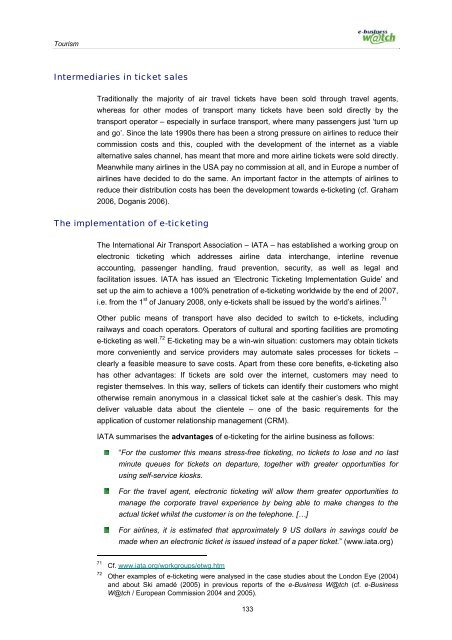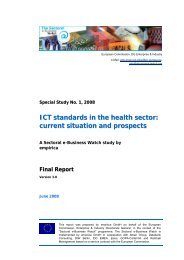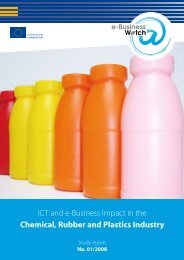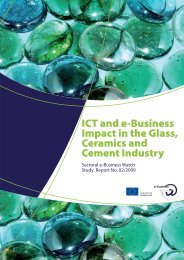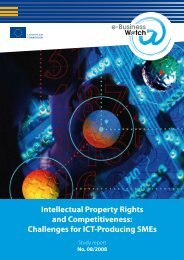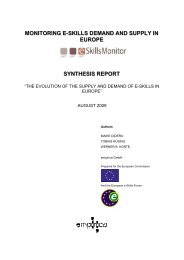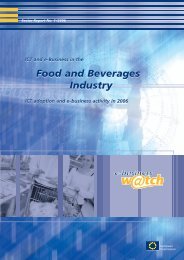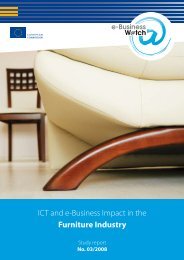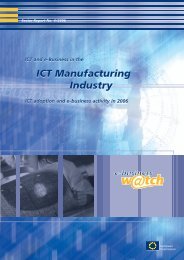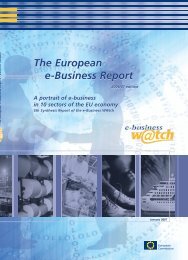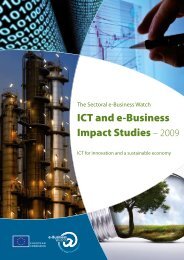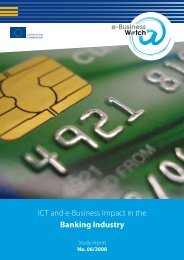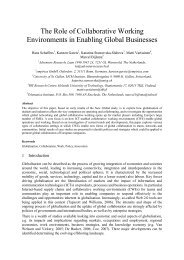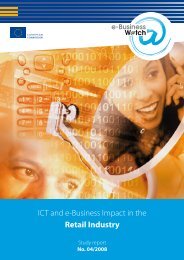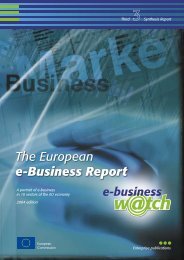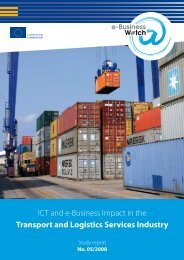ICT and e-business in the tourism industry ICT adoption ... - empirica
ICT and e-business in the tourism industry ICT adoption ... - empirica
ICT and e-business in the tourism industry ICT adoption ... - empirica
You also want an ePaper? Increase the reach of your titles
YUMPU automatically turns print PDFs into web optimized ePapers that Google loves.
Tourism<br />
Intermediaries <strong>in</strong> ticket sales<br />
Traditionally <strong>the</strong> majority of air travel tickets have been sold through travel agents,<br />
whereas for o<strong>the</strong>r modes of transport many tickets have been sold directly by <strong>the</strong><br />
transport operator – especially <strong>in</strong> surface transport, where many passengers just ‘turn up<br />
<strong>and</strong> go’. S<strong>in</strong>ce <strong>the</strong> late 1990s <strong>the</strong>re has been a strong pressure on airl<strong>in</strong>es to reduce <strong>the</strong>ir<br />
commission costs <strong>and</strong> this, coupled with <strong>the</strong> development of <strong>the</strong> <strong>in</strong>ternet as a viable<br />
alternative sales channel, has meant that more <strong>and</strong> more airl<strong>in</strong>e tickets were sold directly.<br />
Meanwhile many airl<strong>in</strong>es <strong>in</strong> <strong>the</strong> USA pay no commission at all, <strong>and</strong> <strong>in</strong> Europe a number of<br />
airl<strong>in</strong>es have decided to do <strong>the</strong> same. An important factor <strong>in</strong> <strong>the</strong> attempts of airl<strong>in</strong>es to<br />
reduce <strong>the</strong>ir distribution costs has been <strong>the</strong> development towards e-ticket<strong>in</strong>g (cf. Graham<br />
2006, Doganis 2006).<br />
The implementation of e-ticket<strong>in</strong>g<br />
The International Air Transport Association – IATA – has established a work<strong>in</strong>g group on<br />
electronic ticket<strong>in</strong>g which addresses airl<strong>in</strong>e data <strong>in</strong>terchange, <strong>in</strong>terl<strong>in</strong>e revenue<br />
account<strong>in</strong>g, passenger h<strong>and</strong>l<strong>in</strong>g, fraud prevention, security, as well as legal <strong>and</strong><br />
facilitation issues. IATA has issued an ‘Electronic Ticket<strong>in</strong>g Implementation Guide’ <strong>and</strong><br />
set up <strong>the</strong> aim to achieve a 100% penetration of e-ticket<strong>in</strong>g worldwide by <strong>the</strong> end of 2007,<br />
i.e. from <strong>the</strong> 1 st of January 2008, only e-tickets shall be issued by <strong>the</strong> world’s airl<strong>in</strong>es. 71<br />
O<strong>the</strong>r public means of transport have also decided to switch to e-tickets, <strong>in</strong>clud<strong>in</strong>g<br />
railways <strong>and</strong> coach operators. Operators of cultural <strong>and</strong> sport<strong>in</strong>g facilities are promot<strong>in</strong>g<br />
e-ticket<strong>in</strong>g as well. 72 E-ticket<strong>in</strong>g may be a w<strong>in</strong>-w<strong>in</strong> situation: customers may obta<strong>in</strong> tickets<br />
more conveniently <strong>and</strong> service providers may automate sales processes for tickets –<br />
clearly a feasible measure to save costs. Apart from <strong>the</strong>se core benefits, e-ticket<strong>in</strong>g also<br />
has o<strong>the</strong>r advantages: If tickets are sold over <strong>the</strong> <strong>in</strong>ternet, customers may need to<br />
register <strong>the</strong>mselves. In this way, sellers of tickets can identify <strong>the</strong>ir customers who might<br />
o<strong>the</strong>rwise rema<strong>in</strong> anonymous <strong>in</strong> a classical ticket sale at <strong>the</strong> cashier’s desk. This may<br />
deliver valuable data about <strong>the</strong> clientele – one of <strong>the</strong> basic requirements for <strong>the</strong><br />
application of customer relationship management (CRM).<br />
IATA summarises <strong>the</strong> advantages of e-ticket<strong>in</strong>g for <strong>the</strong> airl<strong>in</strong>e <strong>bus<strong>in</strong>ess</strong> as follows:<br />
“For <strong>the</strong> customer this means stress-free ticket<strong>in</strong>g, no tickets to lose <strong>and</strong> no last<br />
m<strong>in</strong>ute queues for tickets on departure, toge<strong>the</strong>r with greater opportunities for<br />
us<strong>in</strong>g self-service kiosks.<br />
For <strong>the</strong> travel agent, electronic ticket<strong>in</strong>g will allow <strong>the</strong>m greater opportunities to<br />
manage <strong>the</strong> corporate travel experience by be<strong>in</strong>g able to make changes to <strong>the</strong><br />
actual ticket whilst <strong>the</strong> customer is on <strong>the</strong> telephone. […]<br />
For airl<strong>in</strong>es, it is estimated that approximately 9 US dollars <strong>in</strong> sav<strong>in</strong>gs could be<br />
made when an electronic ticket is issued <strong>in</strong>stead of a paper ticket.” (www.iata.org)<br />
71<br />
72<br />
Cf. www.iata.org/workgroups/etwg.htm<br />
O<strong>the</strong>r examples of e-ticket<strong>in</strong>g were analysed <strong>in</strong> <strong>the</strong> case studies about <strong>the</strong> London Eye (2004)<br />
<strong>and</strong> about Ski amadé (2005) <strong>in</strong> previous reports of <strong>the</strong> e-Bus<strong>in</strong>ess W@tch (cf. e-Bus<strong>in</strong>ess<br />
W@tch / European Commission 2004 <strong>and</strong> 2005).<br />
133


